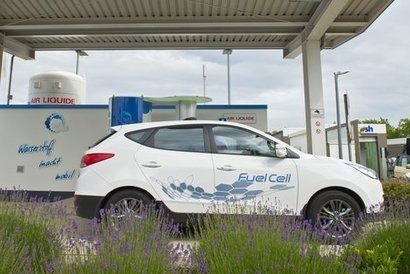
The hydrogen station is partly funded by Air Liquide and the Clean Energy Partnership and will open sometime this summer. It will enable all drivers of fuel cell electric vehicles to refill their zero-emission vehicles in only three to five minutes thanks to high-pressure technology developed by Air Liquide. This will fill the pressure-proof tanks of fuel cell vehicles at a pressure of 700 bar, specified to the latest technology standards and improving the refuelling time.
The new technology enables fuel tanks to utilise their full capacity and thereby nearly double the driving range of fuel cell cars. The new station’s daily capacity of 200 kg of hydrogen is sufficient to fuel over 30 vehicles a day.
“With the opening of a new public Air Liquide hydrogen station at our headquarters, Hyundai Motor is once again contributing to the development of hydrogen-powered mobility” said Thomas A. Schmid, Chief Operating Officer at Hyundai Motor Europe. “We are the first car manufacturer in Germany to have a public refuelling station on site, making zero-emission driving with fuel cell cars more accessible to everyone.”
There are currently about twenty hydrogen stations in Germany and a lot more are planned for the near future. The German Government is planning to establish and subsidise the construction of four hundred such stations until 2023. Some of the most important German metropolitan areas like Berlin, Hamburg, Munich, Düsseldorf and Stuttgart already have them installed.
FCEVs are not a newly developed technology for Hyundai Motor. The ix35 Fuel Cell is its fourth-generation FCEV, following the Santa Fe FCEV in 2000, the Tucson FCEV in 2004 and the ix35 FCEV in 2012. It is the world's first mass-produced and commercially available fuel cell electric vehicle and there are currently more than three hundred of them on European roads in twelve countries. The ix35’s powerful asynchronous electric motor generates 100 kW or 136 PS, and has a maximum torque of 300 Nm. Its range is 594 kilometres on a full tank.
In 2015, Hyundai Motor achieved registrations of 470,130 vehicles in Europe – an increase of 10.9 percent compared to 2014 - replacing 80 percent of its model line-up. Most of the vehicles Hyundai sells in the region are models designed, engineered, tested and built in Europe to meet the needs of European customers, served by the company’s extensive European infrastructure. This includes two factories in the Czech Republic and Turkey, which have a combined annual capacity of 500,000 units. Hyundai Motor sells cars in 31 European countries through 2,500 outlets.
The Clean Energy Partnership (CEP) was founded in 2002 to establish hydrogen as an eco-friendly fuel and help the European Union to meet its targets of reducing harmful greenhouse gas emission by 80 percent by 2050. The CEP consists of twenty companies active in the production of fuel cell vehicles, hydrogen, infrastructure and public transport partnered to advance hydrogen mobility and infrastructure. With the new hydrogen station Hyundai Motor and Air Liquide aim to contribute to the CEP’s mission by not only ensuring the availability of efficient fuel cell vehicles, but also by helping to create an infrastructure necessary to operate the vehicles.
For additional information:

